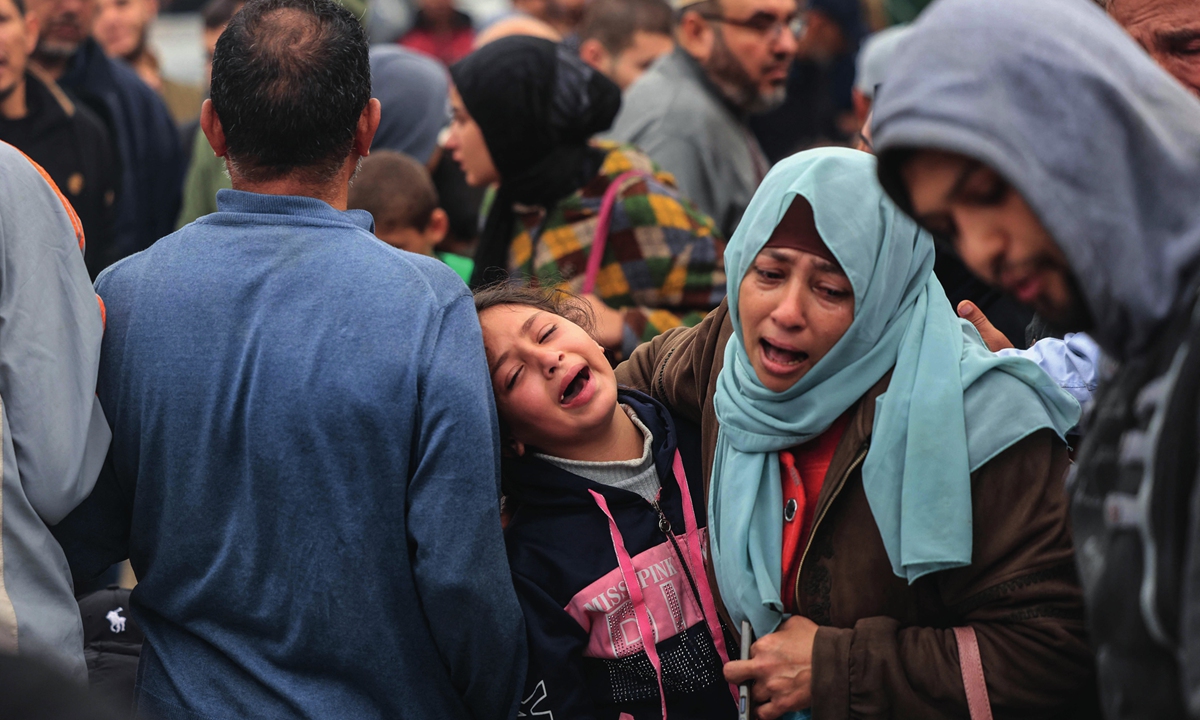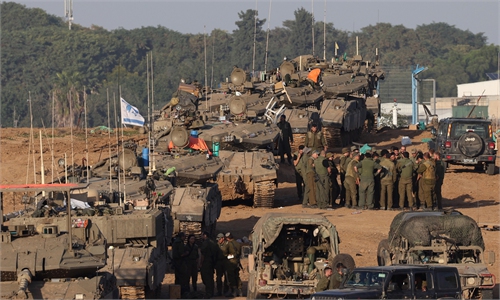Israel expanding offensive in southern Gaza ignites worries
Growing pressure likely to ‘cast shadow over US-Israel ties’

Palestinians mourn the death of loved ones following an Israeli bombardment in the southern Gaza Strip on December 5, 2023, outside a hospital in Khan Younis, amid continuing conflict. Photo: VCG
Given Israel's military has been pushing its operations deeper into southern Gaza, intensifying its airstrikes and even reportedly considering flooding Gaza tunnels with seawater to drive out Hamas fighters, some Chinese experts raised concerns over the worsening humanitarian crisis. They described the offensive as reflecting Israel's determination of expanding its ground operations in Gaza despite mounting pressure from the international community.
As the Israel-Palestine conflict continues, the growing pressure could also cast a shadow over the US-Israel alliance, especially when there have been increasing divisions between the two countries, experts said. US Secretary of State Antony Blinken's four trips to Israel since the beginning of the war have not helped to resolve the differences between the US and Israel.
Israel intensified its bombardment in and around Gaza's second-largest city Khan Younis early on Tuesday, as ambulances and private cars came racing into a local hospital carrying people wounded in a bloody new phase of the war in Gaza, the AP reported.
Israel said it must dismantle Hamas' extensive military infrastructure and remove it from power in order to prevent a repeat of the October 7 attack that ignited the war, the report said.
The Wall Street Journal reported on Monday that Israel has assembled a system of large pumps it could use to flood Hamas's vast network of tunnels under the Gaza Strip with seawater, a tactic that could destroy the tunnels and drive the fighters from their underground refuge but also threaten Gaza's water supply.
Such an operation would put the Biden administration in a tough position and perhaps bring global condemnation, the media report said, citing unnamed officials, and the Israeli military must carefully strike a balance between pursuing their military goals and handling growing global pressure urging them to protect civilians.
Israel renewed its offensive on the Gaza Strip Friday after the end of a week-long truce, according to media reports. UN Secretary-General António Guterres reiterated his call for a sustained humanitarian cease-fire in Gaza and the unconditional and immediate release of all hostages, his spokesperson said on Monday.
"Israel's expanding military operations in Gaza in the past two days, especially the shift to the south, shows that the previous cease-fire agreement between Israel and Hamas is a phased arrangement," Liu Zhongmin, a professor at the Middle East Studies Institute of Shanghai International Studies University, told the Global Times on Tuesday.
It shows that Israel wants to act across the whole of Gaza, and seek what it calls a complete elimination of Hamas, not by creating a buffer zone in the north as it stated, Liu said.
Some experts believe that Israel's plan to flood the tunnels would be a very dangerous move, which could also cause an environmental crisis.
"It's hard to avoid hurting the innocent, as there could be a lot of children and women hiding in tunnels from the air strikes," Li Weijian, a research fellow with the Institute for Foreign Policy Studies of the Shanghai Institutes for International Studies, told the Global Times on Tuesday.
Hamas is still holding many hostages, which it could leverage as part of negotiations for a comprehensive cease-fire, but Israel has vowed to eliminate Hamas, putting itself in a difficult position now, Li noted.
As long as the war goes on, Israel will find itself in a more unfavorable position, the expert warned, noting that the US is also facing growing pressure especially when it could be entangled once again into a Middle East mess.
US National Security Advisor Jake Sullivan said Washington expects Israel to avoid attacking areas identified as "no-strike" zones in Gaza, Reuters reported on Tuesday. He said the US had discussed with Israel how long the war should continue, but he declined to share that timeline.
"The US' attitude began to change at the end of October and early November, and at the stage of the temporary interim cease-fire, the differences between the US and Israel also widened further," Liu said.



